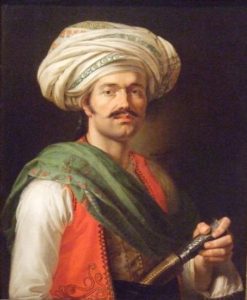 I have just published an extensive anthology of accounts by those who accompanied Napoleon’s expedition to Egypt in 1798. It has been published by Amberley as Napoleon’s Invasion of Egypt: An Eyewitness History. On a much more modest scale, I also published a short memoir by a Polish officer who accompanied Napoleon to Egypt.
I have just published an extensive anthology of accounts by those who accompanied Napoleon’s expedition to Egypt in 1798. It has been published by Amberley as Napoleon’s Invasion of Egypt: An Eyewitness History. On a much more modest scale, I also published a short memoir by a Polish officer who accompanied Napoleon to Egypt.
For the book I spent my time reading dozens of accounts (letters and diaries are best) and have extracted the most interesting excerpts from what they have to offer, trying to order the excerpts by chronology, but with some chapters on themes. There is a lot of culture shock, some great misunderstanding, humour, misery and violence. One of my favourites is by the engineer, Detroye who, writing from the conquered capital of Napoleon’s new empire, noted that “the dates have arrived. Here in Cairo they eat an amazing number and, along with figs, grenadines and some sour little lemons are the only fruits here. And bananas which taste a bit like some of our pear varieties in Europe.” Accounts such as these combine the experience of soldiers in an unfamiliar and harsh environment with recollections by civilian scientists and scholars tasked with studying contemporary and ancient Egypt.
I have already published a book on Napoleon’s Mameluke, Roustam Raza, a gift to the general by one of the governors of Mameluke Egypt. The biographies of those who sided with the French and left with them, later forming a unit in Napoleon’s Guard cavalry, can also be found on this site.
Napoleon’s invasion carried thousands of French soldiers (and dozens of scholars) eastwards into what were unknown lands. What they saw and experienced there made a lasting impression on the survivors (here is one account by an unfortunate dragoon captured by Arab horsemen). Although it came as a brutal shock to most Egyptians, the French invasion did at least have its upsides. Europe learnt a lot about Egypt in the three years the French were there, and the invasion contributed some facts to Europe’s longstanding curiosity about the Levant. France gained in culture and knowledge. The scholars who accompanied Napoleon made some important discoveries. Some were accidental. Here is one example, the story of the man who discovered the Rosetta Stone. Some were less interested in Egyptian culture, and preferred to listen to Haydn in Cairo during the campaign. Another positive was that the French brought important technology with them. Here is an article on the printing presses dragged across the sea to Egypt.
Ultimately, the French invasion led to a French defeat and evacuation. Napoleon had been the first to go. Here is Roustam Raza’s account of Napoleon’s own flight from Egypt.
- Poles during the Napoleonic era
- Napoleon's Police
- Nelson at Naples in 1799
- Napoleon and Saint Domingue
- The Death of Murat
- Napoleon in Russia
- Ireland in the 1790s
- Napoleon and Egypt
- Prisoner of the Arabs
- Napoleon's Mamelukes
- Napoleon flees Egypt
- Joseph Haydn in Egypt
- Who discovered the Rosetta Stone?
- Egyptian propaganda
- Prisoners of War (1792 to 1815)
- Travel in Napoleonic Europe